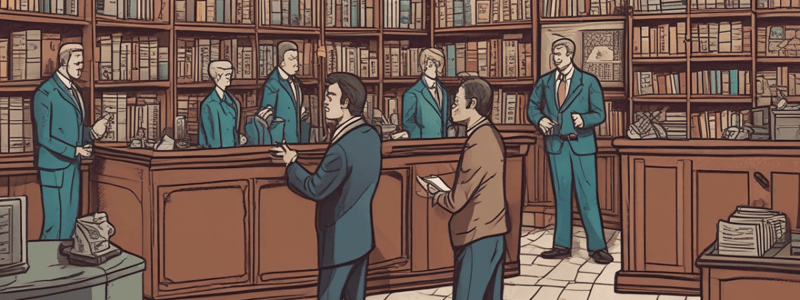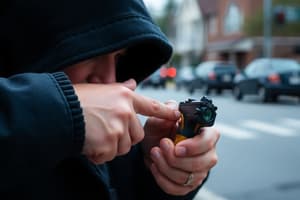Podcast
Questions and Answers
What type of property is commonly trafficked?
What type of property is commonly trafficked?
- Clothing and accessories
- Metals, electronics, jewelry, and firearms (correct)
- Furniture and appliances
- Food and beverages
What is the crime committed when a person sells or disposes of stolen property knowing it is stolen?
What is the crime committed when a person sells or disposes of stolen property knowing it is stolen?
- Theft
- Criminal mischief
- Trespassing
- Dealing in stolen property (correct)
What should you do if a suspect resists reasonable efforts to recover stolen property?
What should you do if a suspect resists reasonable efforts to recover stolen property?
- Charge the suspect with resisting in addition to theft (correct)
- Let the suspect go with a warning
- Charge the suspect with theft only
- Call for backup only
What is the primary goal of the lesson on criminal mischief, trespassing, and burglary?
What is the primary goal of the lesson on criminal mischief, trespassing, and burglary?
What is the definition of criminal mischief?
What is the definition of criminal mischief?
What is an important step to take when investigating an incident of criminal mischief?
What is an important step to take when investigating an incident of criminal mischief?
What elements should be documented for criminal mischief?
What elements should be documented for criminal mischief?
What should you do to preserve evidence of criminal mischief?
What should you do to preserve evidence of criminal mischief?
What is the primary role of the initial responder in a fraud incident?
What is the primary role of the initial responder in a fraud incident?
What is the primary victim of credit card fraud?
What is the primary victim of credit card fraud?
What is the minimum amount of charges required to be considered a felony in credit card fraud?
What is the minimum amount of charges required to be considered a felony in credit card fraud?
What is the method of extracting a customer's credit card information by using a device?
What is the method of extracting a customer's credit card information by using a device?
Who typically investigates fraud incidents?
Who typically investigates fraud incidents?
What is the minimum number of times a suspect must fraudulently use a victim's credit card within a six-month period to be considered a felony?
What is the minimum number of times a suspect must fraudulently use a victim's credit card within a six-month period to be considered a felony?
What is the primary role of the account holder in credit card fraud?
What is the primary role of the account holder in credit card fraud?
What is the chapter of the F.S. that outlines the elements of fraudulent use of a credit card?
What is the chapter of the F.S. that outlines the elements of fraudulent use of a credit card?
What is the primary factor in determining the severity of criminal mischief charges in Florida?
What is the primary factor in determining the severity of criminal mischief charges in Florida?
What is the minimum charge for criminal mischief if the damage is over $1,000?
What is the minimum charge for criminal mischief if the damage is over $1,000?
What is the enhanced penalty for criminal mischief if the suspect has prior convictions?
What is the enhanced penalty for criminal mischief if the suspect has prior convictions?
What is the specific type of crime that is committed when a person willfully and maliciously damages a place of worship or religious article?
What is the specific type of crime that is committed when a person willfully and maliciously damages a place of worship or religious article?
What is the primary requirement for trespassing to occur, as outlined in chapter 810, F.S.?
What is the primary requirement for trespassing to occur, as outlined in chapter 810, F.S.?
What is the consequence of a person refusing to leave a property after being warned by the owner or lessee?
What is the consequence of a person refusing to leave a property after being warned by the owner or lessee?
What is the purpose of providing the victim with the appropriate victim brochures during a follow-up investigation?
What is the purpose of providing the victim with the appropriate victim brochures during a follow-up investigation?
What is the primary consideration in determining whether an incident is criminal mischief?
What is the primary consideration in determining whether an incident is criminal mischief?
What is the primary goal of Lesson 1?
What is the primary goal of Lesson 1?
What should you do if a person is standing or waiting around idly in a public area?
What should you do if a person is standing or waiting around idly in a public area?
What is a characteristic of loitering or prowling?
What is a characteristic of loitering or prowling?
What should you consider when determining whether to be alarmed or concerned about a person's behavior?
What should you consider when determining whether to be alarmed or concerned about a person's behavior?
What is not a criminal act?
What is not a criminal act?
What is the purpose of initiating a consensual encounter?
What is the purpose of initiating a consensual encounter?
What should you do if a person is drinking in front of a store and claims they just need a few minutes to collect themselves?
What should you do if a person is drinking in front of a store and claims they just need a few minutes to collect themselves?
What is not a circumstance that raises alarm or immediate concern for the safety of people or property?
What is not a circumstance that raises alarm or immediate concern for the safety of people or property?
What should you do before making initial contact with a person suspected of loitering or prowling?
What should you do before making initial contact with a person suspected of loitering or prowling?
What is a key aspect of articulating the totality of the circumstances in a loitering and prowling report?
What is a key aspect of articulating the totality of the circumstances in a loitering and prowling report?
What should you do if the person's explanation eases your alarm during a consensual encounter?
What should you do if the person's explanation eases your alarm during a consensual encounter?
What is a potential consequence of failing to release a person when their explanation eases your alarm?
What is a potential consequence of failing to release a person when their explanation eases your alarm?
What is an example of disorderly conduct?
What is an example of disorderly conduct?
What is an affray, in the context of breach of the peace or disorderly conduct?
What is an affray, in the context of breach of the peace or disorderly conduct?
Why is it essential to have a backup officer present during loitering and prowling incidents?
Why is it essential to have a backup officer present during loitering and prowling incidents?
What should you do during a consensual encounter if the person voluntarily explains their presence and conduct?
What should you do during a consensual encounter if the person voluntarily explains their presence and conduct?
Flashcards are hidden until you start studying
Study Notes
Dealing in Stolen Property
- Dealing in stolen property involves selling, transferring, distributing, or disposing of stolen property with knowledge or reason to know that it is stolen.
- Commonly trafficked stolen items include metals, electronics, jewelry, and firearms.
- If a suspect resists reasonable efforts to recover stolen property, they can be charged with resisting in addition to theft.
Criminal Mischief
- Criminal mischief is the willful and malicious destruction of property belonging to another person.
- It can include injury or damage to property, such as graffiti or vandalism.
- To document criminal mischief, note that:
- The suspect injured or damaged real or personal property.
- The property belonged to the complainant.
- The injury or damage was willful and malicious.
- Photograph the damage and conduct a neighborhood canvass to gather information about suspects.
Trespassing
- Trespassing occurs when a person:
- Willfully enters or remains in a structure, conveyance, or property without being authorized, licensed, or invited.
- Willfully enters or remains in a property after the owner tells them to leave or when a trespassing notice is posted.
- Refuses to depart after being authorized to do so.
- In trespassing, a person authorized means an owner or lessee, or their agent, or any law enforcement officer whose agency has received written authorization.
Credit Card Fraud
- Credit card fraud involves the unlawful use of a credit card to obtain property, goods, or services.
- It includes unauthorized use of information to obtain credit or using a credit card without the owner's authority.
- Suspects may fraudulently obtain and use debit or credit cards through falsified applications, burglary, theft, or robbery.
- Skimming is the act of extracting a customer's credit card information using a skimming device.
Loitering or Prowling
- Loitering or prowling involves lingering or hanging around in a public area without any apparent purpose, raising alarm or immediate concern for the safety of people or property.
- Circumstances to consider when determining whether to be alarmed or concerned include:
- If the person flees when a law enforcement officer appears.
- If the person refuses to identify themselves.
- If the person attempts to conceal themselves or any object.
- If the person will not explain why they are there and what they are doing.
- Initiate a consensual encounter to dispel any concerns, explain why you want to talk with them, and be respectful.
Studying That Suits You
Use AI to generate personalized quizzes and flashcards to suit your learning preferences.




